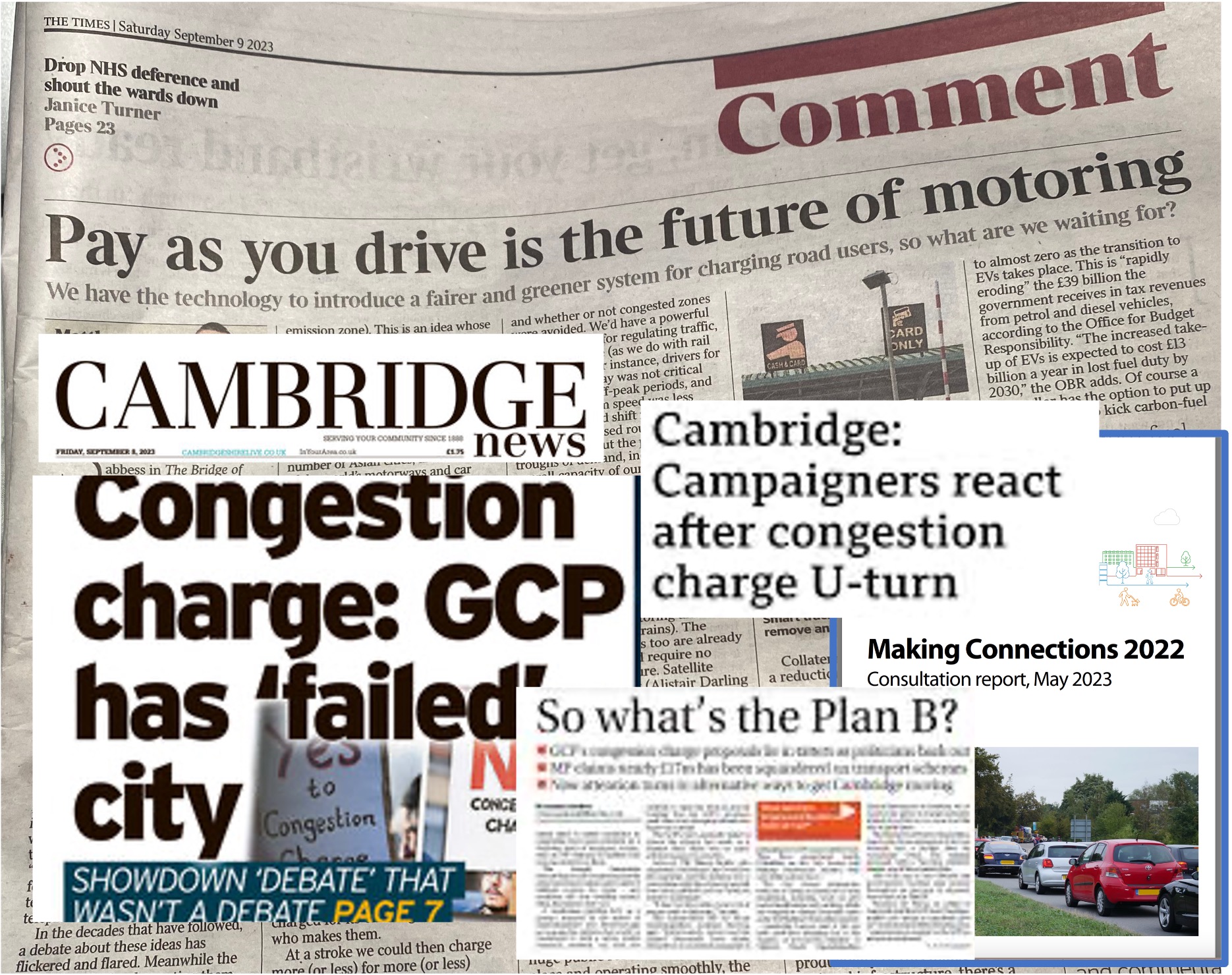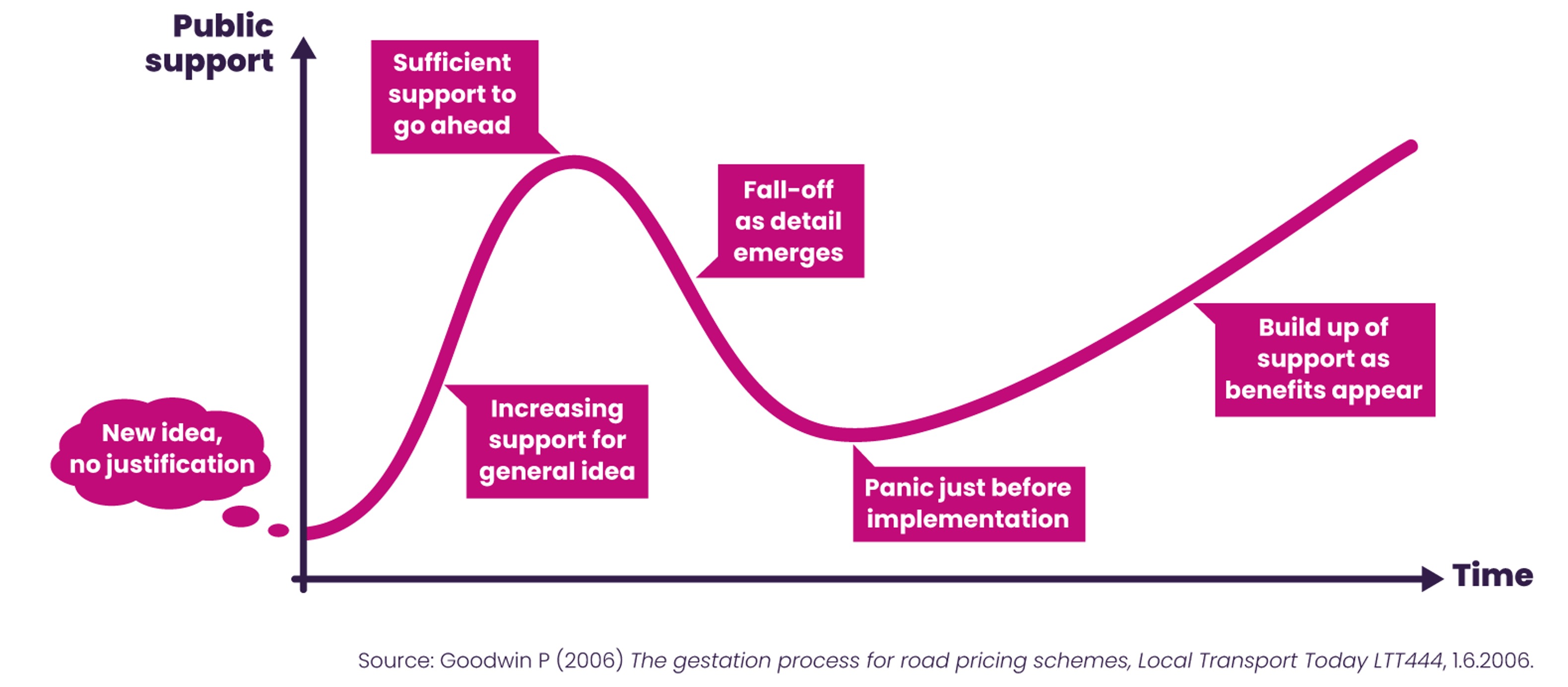This is Blog no. 41
There will be no Congestion charge for Cambridge anytime soon.
In recent days, it has emerged that Labour and Liberal Democrat politicians on the Greater Cambridge Partnership have withdrawn their support for the controversial scheme that promised to transform local bus services – but also introduce a Sustainable Travel Zone(STZ) and the requirement to pay £5 per day for the privilege of driving within it.

It has a long history. Over seven years, there have been studies and strategies, several consultations and even a Citizens Assembly. It culminated in a bitterly-contested consultation last Autumn which I assessed as being problematic in one of my first ConsultationGuRU blogs last December. I called it “Cambridge Congestion Charging illustrates challenges facing many towns and cities.” It turns out to have been a pretty accurate summary.
Nine months later, with the bruhaha of London’s ULEZ policy fresh in our minds, and political parties openly wondering whether they want to fight the next Election as the ‘Motorists’ friend’, we are knee-deep in controversies about transport.
Many climate activists and net zero campaigners’ despair at the difficulties of persuading our fellow citizens that we absolutely must curb our carbon emissions, tackle traffic congestion, and improve our air quality. Why are we so hesitant?
Talking to climate-campaigner, Leo Murray of POSSIBLE (a fascinating activist organisation – its website is worth a visit), this week, he reminded me of 2006 research by Professor Phil Goodwin on the gestation process for road pricing initiatives. In it, he illustrated what has become known as the Goodwin Curve.

It suggests that as theory is translated to real-world proposals, drawbacks and adverse impacts inevitably emerge, and very likely through a public consultation. There is often therefore a haemorrhage of support at this point, and this can lead to a crisis of confidence that makes new policies vulnerable to cancellation or withdrawal. One can recognise this in the ULEZ story, though in that case Sadiq Khan was able to proceed.
What’s happened in Cambridge … and is the consultation to blame?
The first thing to note is that consultation is inevitable. We cannot and should not seek significant changes to people’s behaviour without exposing key decisions to a consultative process. Allowing Councils to introduce some Local Traffic Neighbourhoods (LTNs) without upfront consultation was a bad call during COVID and has caused problems ever since. Consultation will happen; it is a given, and enthusiastic campaigners must resist the temptation to try to implement quick changes surreptitiously in the hope of accelerating up the acceptance phase of the Goodwin Curve before anyone notices.
Secondly, the consultation will always become a rallying cry for opponents. It is the point in the policy-making cycle where the disadvantages as well as the benefits are on the table. Those against change and in favour of the status-quo will always find it easier to argue their case than proponents of a new reality where the benefits are often uncertain. What consultors must avoid is over-selling the proposals and omitting to be truthful about its disadvantages.
Thirdly, a poorly-executed consultation just presents objectors with amore ammunition. In football terms, we present our opponents with a wide-open goal. Political, media and even legal challenges are highly likely, though as with ULEZ, a robust consultation should be able to survive scrutiny.
I have just waded through the 129 pages (ex Appendices) of the Making Connections Consultation Report, published back in May. It has been compiled by WSP and is an excellent example of best practice analysis. It reveals that 24,017 survey respondents participated. They also sought the views of a 1,000 strong demographically representative sample. In headline terms, and to no-one’s surprise, the output revealed considerable support for improvements to bus services and also for more sustainable travel options, but widespread opposition to the STZ and the charging implications for motorists. It provides a wealth of detail about the views expressed by organisations as well as individuals. It is so insightful, for example to read and appreciate why Friends of the Earth in Cambridge opposed the congestion charge! There are lots of equally fascinating findings.
Upon receipt of the consultation output the Greater Cambridgeshire Partnership revised its proposals. It genuinely responded to many of the most common concerns. But the political wind had gone out of its sails. I suspect that local people felt that if it had got so much wrong in the original proposals, and that it needed the consultation to expose the weaknesses which I and others identified last year, then maybe this plan was not so brilliant after all.
In The Politics of Consultation, Elizabeth Gammell and I devoted a whole chapter to political timing. It is critical. It may be bad luck on Cambridge that the consultation output emerged just as the Labour Party realised that Sadiq Khan’s ULEZ scheme was not a sure-fire vote-winner everywhere, and that the cost-of-living issue is making it so much harder to meet just transition standards for contentious behaviour change that affects lower-income groups.
But the need for schemes like this will not disappear and road pricing is set to become an inevitable consequence of changes to the tax base once electric vehicles become the norm. For all these, there WILL be consultation, and it had better be good. That is probably the only way for change-minded politicians to win the argument and get things done.
Rhion H Jones LL.B
See Rhion's speeches etc
For More like this - free of charge: now click here
Leave a Comment
I hope you enjoyed this post. If you would like to, please leave a comment below.